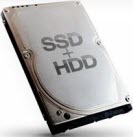Seagate has just launched the third generation of its hybrid drives, superseding the original ‘Momentus X’ range of products which were first introduced mid 2010. The company apparently elected to drop the previous Momentus X monicker and is marketing this latest product line simply as “SSHD”… Laptop SSHD, Desktop SSHD, and Laptop Thin SSHD.
The major difference between models is obviously in size. The Laptop Thin SSHD is 7mm, the Laptop SSHD is 9.5mm, while the Desktop model comes in the standard 3.5″ form factor. All three models utilize 8GB of NAND flash – no increase there over the second generation Momentus X HHD. Although, It is anticipated that Seagate will likely introduce larger cache models at some time down the track.
According to reports, this is the lineup:
| Capacity | Form Factor | Speed | NAND | Price | |
| Laptop Thin SSHD | 500 GB | 2.5” 7mm | 5400 RPM | 8GB MLC | $79 |
| Laptop SSHD | 1 TB | 2.5” 9.5mm | 5400 RPM | 8GB MLC | $99 |
| Desktop SSHD | 1 TB | 3.5” | 7200 RPM | 8GB MLC | $99 |
| Desktop SSHD | 2 TB | 3.5” | 7200 RPM | 8GB MLC | $149 |
*To date, I have been unable to confirm actual pricing through retail outlets.
The NAND mostly acts as a read cache… although, according to Seagate, unlike the older Momentus X this new SSHD range will also be able to cache ‘some’ writes. Apparently, Seagate is particularly proud of its aggressively tuned algorithms which, it claims, provide very low time-to-use performance.
Seagate SSHDs fuse the blazing speed of solid state drives (SSD) with the high capacity of a hard drive to unleash your system’s performance. Powered by Adaptive Memory™ technology, SSHD technology enables your system to boot, load and run applications faster. Do more and wait less with an SSHD for your laptop or desktop PC.
So, the inevitable question… how will the new Seagate hybrid drives compare to SSDs in terms of performance? According to Seagate’s own benchmarks, the results are reasonably close. However, I think we all realize we can take that with a grain of salt. I for one could not see these hybrid drives comparing all that favorably with overall SSD performance. That said, they are bound to offer improved performance over traditional hard drives and, of course, other considerations such as capacity to pricing ratio add sway to the the hybrid cause.
I’m not 100% certain of US prices but, after a quick check on Amazon and NewEgg, it appears a 64GB SSD averages out at around $80.00 and a standard 1TB HDD at about the same. For your average Joe User, I’d imagine a $99.00 price tag as opposed to the combined $160.00 … plus a guaranteed performance boost at whatever level … would be a pretty attractive proposition. It’s also not too difficult to perceive the advantages of SSHD in Ultrabooks and other slimline form factor PCs.
Read more on the Seagate hybrid SSHD drives here: http://www.seagate.com/solutions/solid-state-hybrid/


400RPM for your 3rd gen Hybrid drives don’t make sense. It is opposite to your policy of desktop drives, where you no longer make 5400/5900RPM desktop drive but just 7200RPM drives. This was because you think 5400RPM drives waste time and don’t save that much power and you are exactly right.
Why not make the same policy for laptop drives? Power consumption isn’t an issue. A 5400RPM vs 7200RPM drive takes less than 1 watt more on average. I know hybrid drives are a bit different but they still benefit from fast mechanicals since it’s only 8GB of flash and doesn’t cache writes.
Hi Dan – Not sure why you have seemingly addressed me throughout your comment… I don’t make the drives mate, I just write about them. 🙂
Anyway, I do agree with you regarding the RPM issue.
Cheers… Jim
I replaced the 5400 RPM HDD in my Toshiba laptop with a Seagate hybrid and was severely disappointed. Boot time decreased by only a few seconds, and nothing else changed noticeably. Seagate Tech Support responded to my complaint/inquiry that the boot speed must be determined by something else such as bus speed, RAM, peripherals, etc.
I remained disappointed.
Thanks for your input here Jon… interesting!!